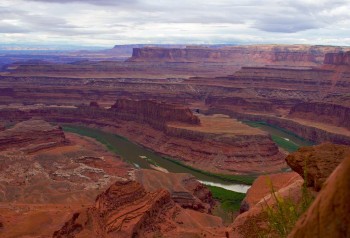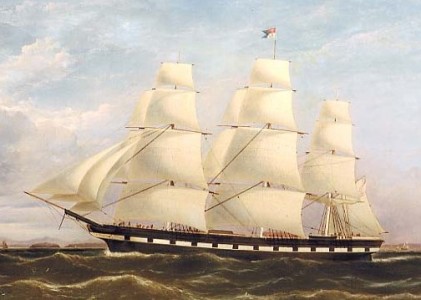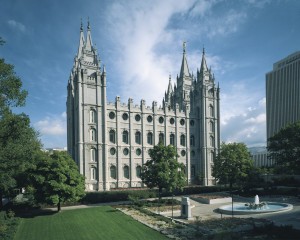The young couple eventually went to pioneer in the high desert country near Vernal, Utah, a place where the only thing green was the town’s name and the name of the Green River flowing nearby. The land was so remote that it became notorious as a location along the infamous “Outlaw Trail,” where various wild west outlaws could roam and hide freely during the late 1800s. Despite of, or perhaps because of, the heat and the cold, the dryness and the rough company, William Tapscott Gillman grew to be a strong, faithful Mormon man, and a successful farmer. He married Catherine McKowen in 1887 in Vernal, Utah. Together they raised ten healthy children, all members of The Church of Jesus Christ of Latter-day Saints.
Catherine McKowen’s father, Philip, married her mother in Manchester, England. They, too, joined The Church of Jesus Christ of Latter-day Saints and travelled over sea and land to Vernal, bringing Philip’s Irish parents, Patrick and Mary Katherine, along. Patrick and Mary McKowen’s parents never saw their children again. Once, a distant relative of mine dreamed about Patrick’s father, watching the cold sea as the ship carrying his family away disappeared into the distance. As faithful Catholics, Patrick’s parents were persecuted in Ireland for their beliefs, and the state was forbidden to record their births, deaths, and marriages. What little information remained about them was burned in a fire. Even their names and birthdates have been lost. But their legacy came to America with their children and grandchildren.
William Tapscott and Catherine McKowen Gillman are the parents of my grandmother, Nora Gillman Moore. My name is Nora, too. I have grown up in physical prosperity and spiritual wealth, the beneficiary of the sacrifices and faithfulness of those who came before me. Although they have passed away, I often feel surrounded by their faith and concern.
On March 18, 2012, the Mormon Tabernacle Choir sang the following revivalist hymn on its weekly broadcast, “Music and the Spoken Word.” The words and music brought the memory of my ancestors’ sacrifices back to me:
I have some friends before me gone
Who love to sing hosanna,
And I’m resolved to travel on,
For I love to sing hosanna,
For we have but the one more river to cross,
And then we’ll sing hosanna,
For we have but the one more river to cross,
And then we’ll sing hosanna.
Mormon Beliefs About Death: Eternal Spirits, Eternal Families
Mormons believe that death is just one more event along the way of our eternal lives. Every human being possesses an immortal spirit, which lived with God before being born here on earth. When we die, we retain our individuality, our loves, our skills, and our faith. Amulek, an ancient prophet who lived in the Americas prior to the time of Christ, taught that “that same spirit which doth possess your bodies at the time that ye go out of this life, that same spirit will have power to possess your body in that eternal world” ( Alma 34:34). Amulek’s teachings are recorded in The Book of Mormon: Another Testament of Jesus Christ, the religious history of his people.
The Prophet and Twelve Apostles of The Church of Jesus Christ of Latter-day Saints possesses the ancient “sealing” power given to Peter by the Lord Jesus Christ in Matthew 18:18. This power, restored to the founding prophet of Mormonism, Joseph Smith, in a visit from the ancient prophet Elijah to the Mormon temple in Kirtland, Ohio in the 1830s, allows those with proper priesthood authority to bind families together for eternity in ordinances performed in Mormon temples. My grandmother’s parents were sealed in the temple to each other and to their children, as were my grandparents and my parents. I have been sealed in the temple to my husband and children. The sealing power that has made its way through the generations to me gives my ancestors the right and responsibility to watch over me forever. Along with others of my progenitors who sacrificed their wealth, land, and health for the gospel of Jesus Christ, they form an army of faithful men and women, strengthening me. My children, in their turn, are beginning to form an army of my descendants, whom I am responsible watch over and teach, hoping that the gospel of Jesus Christ will make all the difference in their lives, as it has in mine:
One army of the living God,
We love to sing hosanna,
Part of the host have crossed the flood
Who love to sing hosanna.
For we have but the one more river to cross,
And then we’ll sing hosanna,
For we have but the one more river to cross,
And then we’ll sing hosanna.
I sing with a choir every Sunday morning; I have always loved to sing. Singing, for me, is my truest way to worship God, and to testify of Him. Sometimes, when we sing the old Mormon pioneer hymn, “Come, Come Ye Saints,” I think I can hear an Irish or English brogue, singing the words alongside me. I imagine it is Alice Wickham, or one of the Katie McKowens, singing along. I sense that they, along with my Grandma Nora, are aware of me in my joys and trials of life. Someday I, too, will “cross the river,” and meet them in the world of spirits. There we will continue together to fight for God and for right, as we have spent our lives doing here. I look forward to seeing them there.
Amen, amen, my soul replies,
I love to sing hosanna,
I’m bound to meet you in the skies
Where we will sing hosanna.
Hosanna, hosanna,
And then we’ll sing hosanna,
For we have but the one more river to cross,
And then we’ll sing hosanna.




